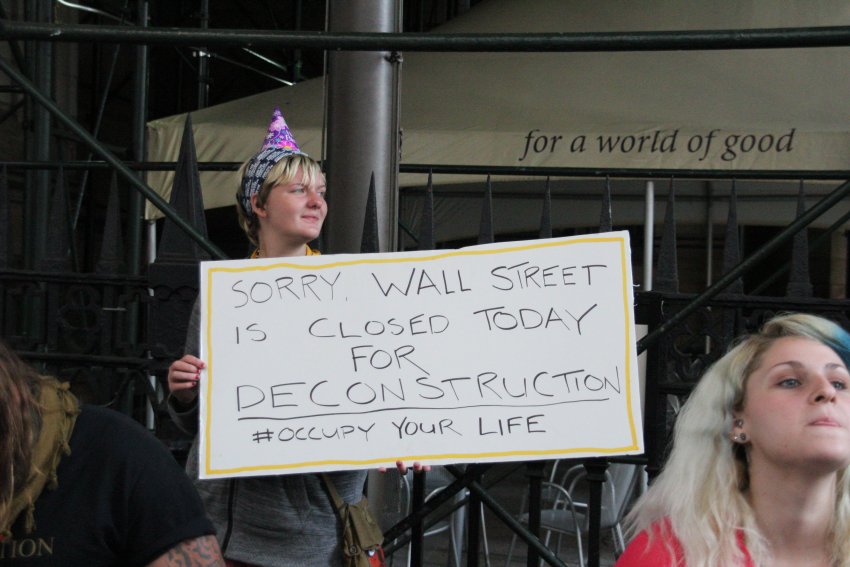
The Occupy movement held rallies across the United States on September 17 to mark the first anniversary of the protests that attacked the corrupt and abusive rule by the richest 1%.
With the protest camps having been broken up by police months ago, the movement has sought to find new ways to fight the gross social injustice that pervades US society.
Wiki.Occupy.net listed actions in 28 US cities and in at least 10 other places around the world on September 17.
Inthesetimes.com said about 1000 people marched in New York's financial district that day. The protest was organised into several different smaller mobilisations to hamper any attempt by police to shut it down.
The events had a festive mood, raising issues of debt, education, the environment, workers' rights and more.
About 185 people were arrested. Inthesetimes.com said: “Some protesters were handcuffed for non-violent civil disobedience inside private financial institutions, but many were plucked at random off the sidewalk; one white-shirted officer gave the command to 'Go grab some bodies.'”
Several journalists and a lawyer were among those arrested, Alternet.com said on September 18.
Another prominent rally took place in San Francisco, where activists protested against home evictions by banks and the criminalisation of homelessness, Alternet.com said. Protesters sat down in front of Harvey Milk Plaza against laws that ban sitting and lying down on footpaths, a law used to target homeless people.
Protesters later symbolically tore up their personal debts in front of the headquarters of Wells Fargo bank. They blamed the predatory lending practices of banks for the huge number of home evictions across the country.
Organiser Amy O'Hair told Alternet.com: “It looks like we got 3000 people out, which is fantastic for a Monday evening, and lots of people came forward to tear up their debt. I think people were in a celebratory mood. It felt really good to be in the streets.”
Much of the mainstream media lined up to mock the latest protests and declared the movement dead and irrelevant. The New York Times said on September 17: “It will be an asterisk in the history books, if it gets a mention at all.”
Such derisive criticism failed to mention the role of police repression in breaking up the protest camps last year and hampering other mobilisations that followed.
Activist Rebecca Solnit said at Tomdispatch.com on September 16: “Americans have a tendency to think of activism like a slot machine, and if it doesn't come up three jailed bankers or three clear victories fast, you've wasted your quarters.”
Using this kind of thinking, Occupy would qualify as the failure the mainstream media wish it to be. The social injustice the movement railed against worsened last year.
Thinkprogess.org listed 10 markers of growing inequality in the US on September 17:
- Income inequality grew last year. Income dropped for the bottom 80% of people but rose for the top 20%.
- The US’s top 1% have 288 times as much wealth as the median household, more than double the difference from 50 years ago.
- Income inequality in the US makes it harder to escape poverty than other First World countries.
- The shift in income inequality over the last three decades is the equivalent of moving [US]$1.1 trillion of income from the 99% to the top 1 percent every single year,” said Professor Alan Krueger, chairperson of the Council of Economic Advisers.
- Corporate profits have skyrocketed over the past three years, despite the financial crisis.
- Workers are not being compensated for productivity increases.
- The bottom 95% of Americans have $1.48 in debt for every $1 in earnings. The top 5% have 64 cents in debt for every $1 in earnings.
- The financial sector’s profits have bounced back, while workers' incomes have not.
- CEO pay increased 127 times faster than worker pay over the past 30 years.
- Low-wage jobs are increasing. One in four private-sector workers makes less than $10 an hour.
However, Solnit said political victories by activists often go unrecognised.
“We get more victories than anyone imagines,” Solnit said, “but they are usually indirect, incomplete, slow to arrive, and situations where our influence can be assumed but not proven ― and yet each of them is worth counting ...
“I'm convinced that pressure from Occupy and the student activists around it was what put student debt in the Democratic platform and has made it a major talking point of the Obama campaign.
“I worry that if, 10 years from now, the landscape of educational finance has been transformed for the better, no one will remember why or how it happened, or who started it all, so no one will celebrate or feel how powerful we really can be.”
Another example is the big teachers' strike in Chicago, which has been made possible by the political climate created by Occupy.
It cannot be doubted that Occupy has not only made prominent issues of social justice that were once off the mainstream radar, it has raised the spirits of thousands of people to fight back.
Mark Naison, a professor at Fordham University in New York City, told CBSnews.com on September 16: “I don't think Occupy itself has an enormous future. I think that movements energized by Occupy have an enormous future.”
It remains to be seen if the physical Occupy camps will return at any stage, but the direct impact of the movement can be seen in campaigns such as Occupy Homes, which fights to stop home foreclosures, and Occupy Monsanto, which campaigns against the corporate giant's role in creating genetically modified food.
A year is a very short time when looking at the history of social movements. What began on Wall Street on September 17 last year, may have effects for a long time to come.